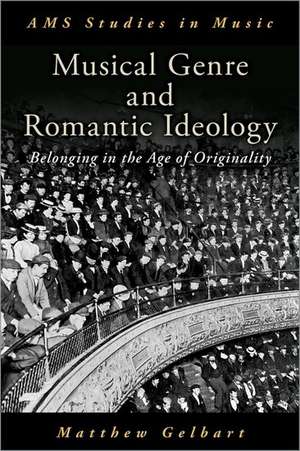Musical Genre and Romantic Ideology: Belonging in the Age of Originality: AMS STUDIES IN MUSIC SERIES
Autor Matthew Gelbarten Limba Engleză Hardback – 18 noi 2022
Preț: 445.85 lei
Preț vechi: 490.09 lei
-9% Nou
Puncte Express: 669
Preț estimativ în valută:
85.32€ • 91.23$ • 71.13£
85.32€ • 91.23$ • 71.13£
Carte disponibilă
Livrare economică 17-24 martie
Preluare comenzi: 021 569.72.76
Specificații
ISBN-13: 9780190646929
ISBN-10: 0190646926
Pagini: 552
Dimensiuni: 239 x 164 x 40 mm
Greutate: 0.95 kg
Editura: Oxford University Press
Colecția OUP USA
Seria AMS STUDIES IN MUSIC SERIES
Locul publicării:New York, United States
ISBN-10: 0190646926
Pagini: 552
Dimensiuni: 239 x 164 x 40 mm
Greutate: 0.95 kg
Editura: Oxford University Press
Colecția OUP USA
Seria AMS STUDIES IN MUSIC SERIES
Locul publicării:New York, United States
Recenzii
Musical Genre and Romantic Ideology is a tour de force. By dint of extraordinarily comprehensive historical research and sophisticated theoretical insights, Matthew Gelbart demonstrates how and why genre mattered deeply in the nineteenth century, even when it seemed absent, challenged, or denied - and why, even today, we cannot escape the shadow of Romantic understandings of musical genre.
'Why should we care about genre?' The question, posed in the Prologue, is explored in depth over the course of this fascinating, erudite book. The concentration on nineteenth-century music, immediately thought-provoking, yields spectacular results, offering new perspectives on music we may have thought we knew very well indeed. ... a vital contribution to the continuing debates about music and the social world it inhabits.
Defining genre generously and Romanticism unromantically, Gelbart proves two crucial points: that genres never stopped shaping musical experiences, and that Romantic aesthetics still haunt our relations to artworks, media, and one another. Gelbart has read everything. He always finds the perfect musical example, the salient anecdote, the pithy quote. By confronting entrenched ideologies with the reality of what actually happened, he provides a wholly new picture of musical cultures we can't-and shouldn't-stop caring about.
Taking his cue from various literary reflections on the enabling power of genre, Mathew Gelbart revisits one of the fundamental questions about music: how do we classify and describe works, groups of works and parts of works? Moving from Wagner, to Verdi, Brahms, Chopin, and Bizet, Gelbart offers radical new ways of talking about genre and its implications.
Matthew Gelbart assimilates a broad range of genre theory and adds his own nuances spurred on by the specifics of the Romantic music that forms the basis of the study. As such, he highlights how genre is one the ties that binds Western art music of the 19th century to contemporary popular music as well as to other types of music. Musical Genre and Romantic Ideology is impeccably researched and a pleasure to read.
'Why should we care about genre?' The question, posed in the Prologue, is explored in depth over the course of this fascinating, erudite book. The concentration on nineteenth-century music, immediately thought-provoking, yields spectacular results, offering new perspectives on music we may have thought we knew very well indeed. ... a vital contribution to the continuing debates about music and the social world it inhabits.
Defining genre generously and Romanticism unromantically, Gelbart proves two crucial points: that genres never stopped shaping musical experiences, and that Romantic aesthetics still haunt our relations to artworks, media, and one another. Gelbart has read everything. He always finds the perfect musical example, the salient anecdote, the pithy quote. By confronting entrenched ideologies with the reality of what actually happened, he provides a wholly new picture of musical cultures we can't-and shouldn't-stop caring about.
Taking his cue from various literary reflections on the enabling power of genre, Mathew Gelbart revisits one of the fundamental questions about music: how do we classify and describe works, groups of works and parts of works? Moving from Wagner, to Verdi, Brahms, Chopin, and Bizet, Gelbart offers radical new ways of talking about genre and its implications.
Matthew Gelbart assimilates a broad range of genre theory and adds his own nuances spurred on by the specifics of the Romantic music that forms the basis of the study. As such, he highlights how genre is one the ties that binds Western art music of the 19th century to contemporary popular music as well as to other types of music. Musical Genre and Romantic Ideology is impeccably researched and a pleasure to read.
Notă biografică
Matthew Gelbart is Associate Professor of Music at Fordham University. Following his previous book The Invention of "Folk Music" and "Art Music": Emerging Categories from Ossian to Wagner and his work on nineteenth-century European music and twentieth-century popular music, he is interested in how we make meaning from music through categories and identities.
